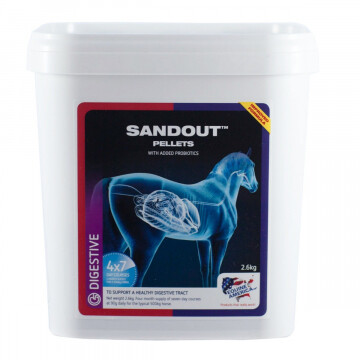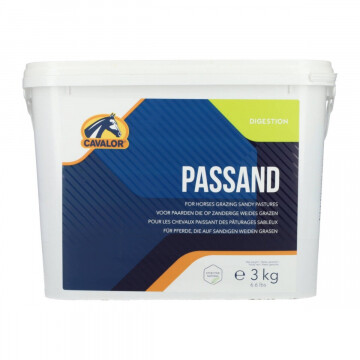Sand Treatment
{syllium husk for your horse
Does your horse have access to sandy or sparse pastures? Reduce the risk of sand accumulation with psyllium husk for horses. In our assortment, you will find high-quality products with psyllium husk and psyllium seed, known for their gel-forming effect that helps to remove sand from the intestines. Suitable for preventive use or as a cure, available from top brands like TRM, Equine America, Pavo, and Vitalbix.
Advice from a specialist
Would you like to know more about psyllium husk or do you need tailored advice from one of our specialists? Contact Charlotte. Charlotte knows everything about our sand cures and can help you make the right choice.
-
-10%

-
-20%

-
-20%

Why Psyllium Husk for your horse?
Horses grazing on bare pastures or eating hay in the paddock risk ingesting sand. This can accumulate in the intestines and lead to sand colic or digestive problems. A sand cure helps to safely remove this sand.
These supplements often contain psyllium fibers, which bind moisture in the intestines, creating a gel-like mass. This gel-like mass stimulates intestinal activity, and accumulated sand adheres to this mass, facilitating its removal from the intestines.
It is advisable to do this in combination with an omega oil or linseed oil. For example, the TRM Sandxpell contains psyllium fibers in combination with Omega 3-6-9, or you can supplement with an Omega oil separately.
Sand Clear from Farnam for your horse
This supplement is specifically designed for horses that tend to eat sand. Farnam's Sand Clear ensures that accumulated sand is effectively removed thanks to its 100% natural psyllium. If your horse frequently eats sand, this cure is suitable for monthly use. For horses that do not eat sand frequently, it is best to administer it mid-way through the sand-eating period and again after this period.
Psyllium for horses – the natural solution
Psyllium husk (flaxseed fibers) and psyllium seed contain soluble fibers that form a gel in contact with moisture. This gel binds sand particles in the intestines, allowing them to be naturally excreted through the feces.
Benefits of psyllium in horses:
- Helps remove sand accumulation in the intestines.
- Supports healthy intestinal function.
- Can be used preventatively in horses at increased risk.
- Easy to mix with feed.
When to administer a psyllium husk?
- Preventive: 4–7 days per month for horses on sandy soil or bare pastures.
- Recovery: in consultation with a veterinarian, often 7–10 consecutive days.
- Seasonal: extra during dry summers or wet winters when grass is scarce.
Our range of psyllium husk
We offer a wide selection of psyllium husk, including:
- Psyllium husk horse – pure flaxseed fibers with maximum gel formation.
- Psyllium seed horse – whole seeds, often combined with herbs for extra support.
- Combi-formulas – a mix of psyllium, prebiotics, and herbs to support gut health.
Need advice?
Want to know which psyllium husk is most suitable for your horse? Contact our specialist for personalized nutritional advice.
Why does my horse need psyllium husk?
Horses grazing or fed on sandy soil can ingest sand unknowingly. This can accumulate in the intestines and lead to colic or digestive problems. A sand cure helps to safely and naturally remove this sand. We recommend giving a sand cure preventatively at least twice a year.What is psyllium and how does it work in horses?
Psyllium husk (flaxseed fibers) and psyllium seed are rich in soluble fibers that form a gel in contact with moisture. This gel binds sand particles in the intestines, allowing them to be excreted through the feces.What is the difference between psyllium husk and psyllium seed?
Psyllium husk consists of the fibrous outer layer of the seed and forms a stronger gel than whole psyllium seed. Psyllium seed also has a mechanical effect in the intestine and can sometimes be combined with herbs for extra support.How often should I give my horse psyllium husk?
Preventively, a 7-day course per month, twice a year, is often advised. In case of suspected sand accumulation, a course of 7–10 consecutive days can be given in consultation with a veterinarian.Can I give psyllium year-round?
Yes, psyllium can be used preventively year-round, especially for horses on sandy soil or bare pastures. Alternate preventive use with breaks to prevent habituation.


